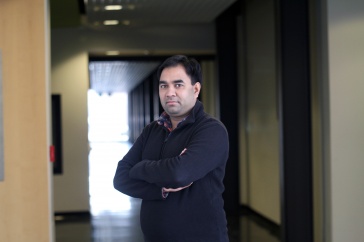
Associate professor of chemical engineering Kyung Jae Jeong (left) and assistant professor of chemical engineering Young Jo Kim, recipients of a National Institutes of Health "Trailblazer" award.
Kyung Jae Jeong and Young Jo Kim, associate and assistant professors, respectively, of chemical engineering, received a National Institutes of Health “Trailblazer” award for a project that aims to improve chronic wound healing. With the three-year, $600,000 grant, from NIH’s National Institute of Biomedical Imaging and Bioengineering, Jeong and Kim will develop an injectable formulation for chronic wounds using melanin extracted from cuttlefish and a biocompatible hydrogel.
“One main reason chronic wounds do not easily heal is the highly elevated levels of a group of enzymes called matrix metalloproteinases, or MMPs,” says Jeong. “The innovative formulation developed by our research utilizes the naturally occurring melanin to deactivate MMPs with minimal side effects and is expected to accelerate the healing of chronic wounds.”
“The most exciting part of our research is to use the natural melanin that is extracted from cuttlefish ink sac. The melanin is a. naturally occurring biomaterial, and biodegradable,” says Kim. “That makes it the ideal material for this type of biomedical application.”
-
Written By:
Beth Potier | UNH Marketing | beth.potier@unh.edu | 2-1566




















































